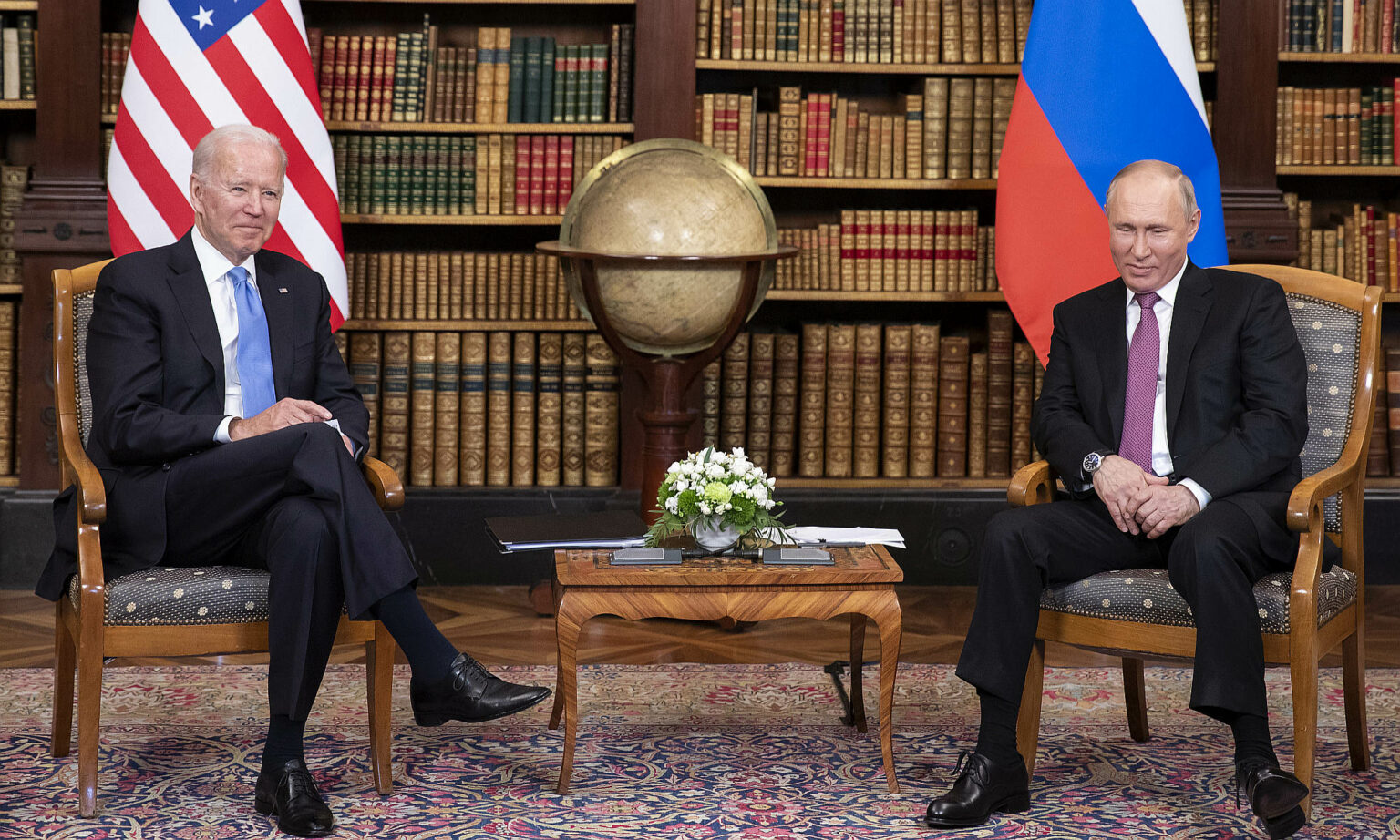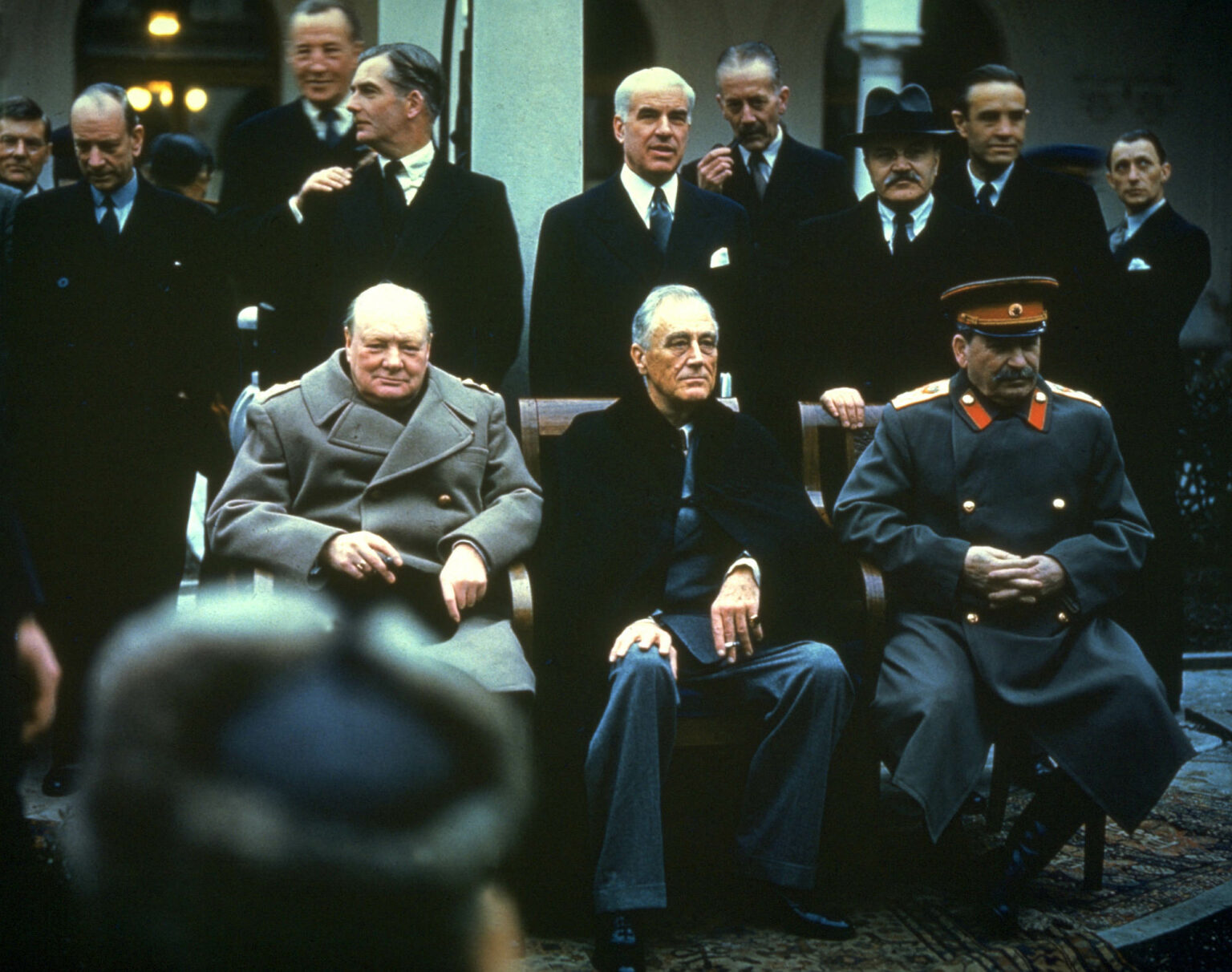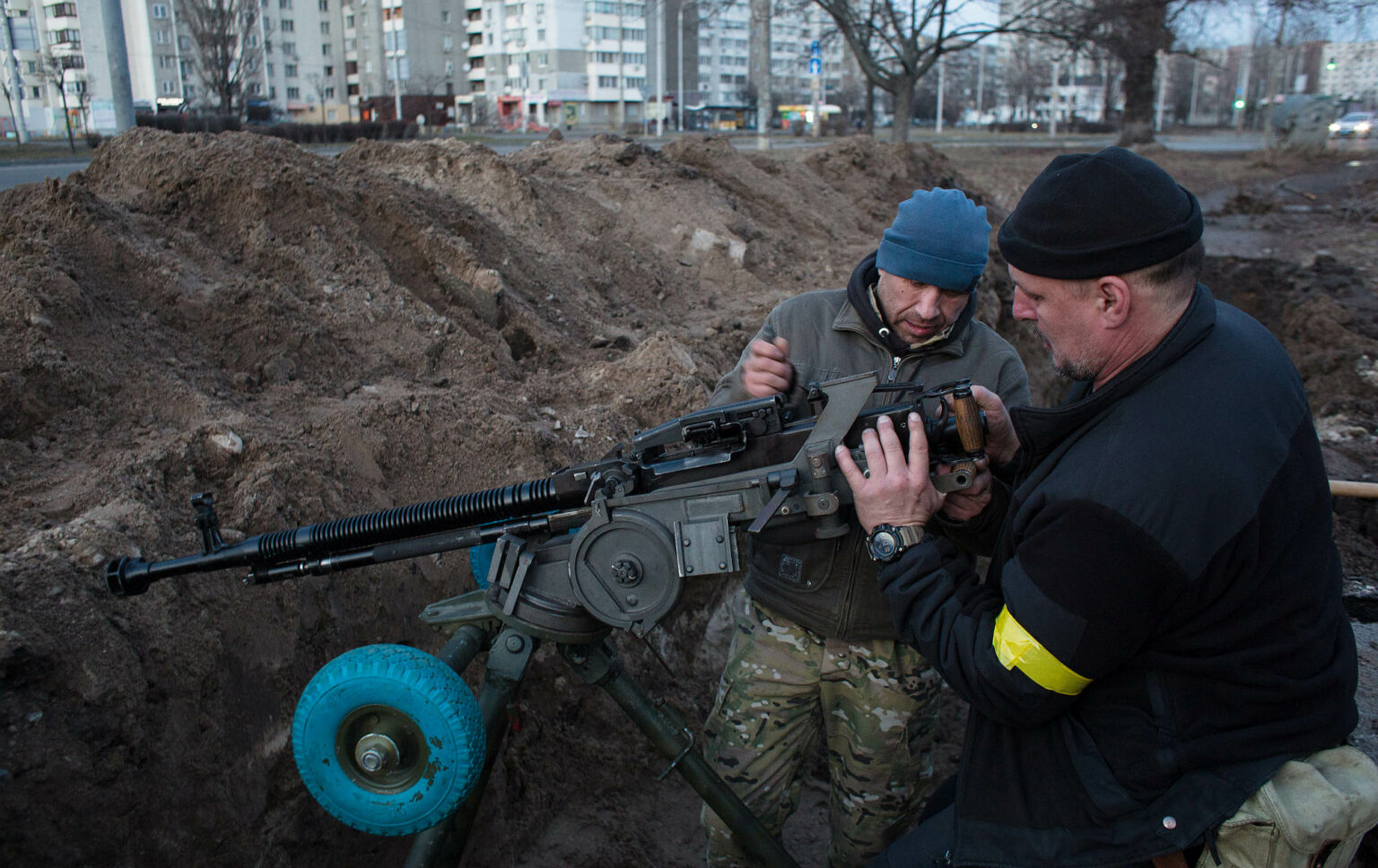
Long-read
Ukraine and the new world disorder
The US and Russia are once again trying to decide the future of Europe.
Want to read spiked ad-free? Become a spiked supporter.
Seventy-seven years on, are we on the road to another Yalta?
After all, it was the signing of the postwar settlement at Yalta in Crimea that led to the division of Europe between the Great Power interests of the US and the USSR. This led to Eastern and Central European nations being turned into vassal states of the Soviet Empire (a betrayal for which many in Eastern and Central Europe still hold the West responsible). So is the war in Ukraine the beginning of a similar re-ordering of Europe according to the interests of America and Russia?
There are certainly eerie similarities. At the time, the pact signed at Yalta by the leaders of the Soviet Union, Britain and the United States exposed a new geopolitical reality. European nations had been reduced to the status of relatively insignificant powers in a global order dominated by America and the Soviet Union. Over the past year of rising Russia-Ukraine tensions, Europe’s role in global affairs became even more peripheral.
Yes, in recent days, we have seen European powers try once more to assert themselves. First, the EU and Britain, alongside the US and Canada, moved to block Russia’s access to the Swift international banking payment system, hampering Russians’ ability to perform everyday financial transactions. Even more significantly, German chancellor Olaf Scholz has reversed Germany’s decades-old aversion to militarism, announcing an unprecedented additional $113 billion for the German army, alongside a constitutional commitment to NATO’s military spending target of two per cent of GDP. He has even confirmed that Germany will be sending weapons to Ukraine, after months of refusing to do so. This all amounts to a far more assertive stance on the part of the EU, and especially Germany, towards Russia.
But it seems highly unlikely this will change the trajectory of the conflict. This was set in train in the months leading up to Russia’s invasion, when European leaders were reduced to the role of extras. It was the US and Russia, Biden and Putin, who were the main players. It was they who were engaging in significant diplomatic manoeuvres, not the leaders of France or Germany. So when Washington unilaterally decided to send an extra 3,000 troops to Poland and Romania in February 2022, it made no pretence of consulting with the European Union.
A New York Times headline from January captured the sidelining of the EU well: ‘US and Russia will discuss European security, but without Europeans.’ Indeed, the NYT reported that these bilateral talks had revived ‘old fears that the two Cold War powers will forge a deal on their own’. The EU’s foreign-policy chief, Josep Borrell, expressed concerns earlier this year about the high-handed approach of the US and Russia. ‘We are no longer in the Yalta times when the great powers met in 1945 to divvy up postwar Europe’, he said. The European Union ‘cannot be a spectator’, he continued, while the United States, NATO and Russia discuss European security. But as the invasion in Ukraine got underway, that is precisely what Europe was – a spectator.
Like their neighbours in Poland, Romania, Hungary and Slovakia, many Ukrainians have long felt that the West does not have the appetite for a military confrontation with Russia. They know that in the end it will be up to them, and to resistance from within Russia, to prevent the reimposition of Yalta 2.0.

Many analysts and commentators suggest that the invasion of Ukraine was planned long before it was set in motion. They contend that it is part of Russia’s attempt to re-establish its Soviet-era power and influence. Another version of this thesis asserts that this is all a product of Putin’s obsession with Russia’s history, and his desire to recreate some sort of Russian empire.
Is this plausible? Is it really the case that, thanks to Putin alone, the invasion of Ukraine was inevitable? Or are there other factors and influences at play, which set the stage for this bloody invasion of a sovereign nation?
We must certainly oppose and condemn the Russian invasion of Ukraine. But we can’t let this blind us to the fact that there is more to this conflict than the supposed personality deficits of Putin.
As political scientist Stephen Walt notes, there is something amiss with this ‘black-and-white view of the situation in Ukraine’. As Walt rightly observes, since the end of the Cold War, the West has refused to make any concessions to Russia’s security concerns. Neither NATO nor the Western powers in general have been willing or able ‘to empathise with the Russian perspective on this crisis’, he writes. In particular, they have been unable to recognise that NATO’s 2008 declaration that Ukraine and Georgia would eventually join the alliance would be seen in Russia as a security threat.
It is important to note that, after the collapse of the Soviet Union, Russian leaders believed that their security concerns had been recognised by Washington. As documents at the National Security Archives show, then Soviet leader Mikhail Gorbachev received a ‘cascade of assurances about Soviet security’ from Western leaders during the process of German reunification. It was at this point, in 1990, that the then US secretary of state, James Baker, famously assured Gorbachev that NATO would expand ‘not one inch eastward’. CIA director Robert Gates also told Gorbachev that NATO would not expand after the Soviet Union withdrew forces from Eastern Europe.
As it turned out, by the mid-to-late 1990s, American policymakers were happy to ignore the assurances offered by Baker and Gates. And so NATO began its expansion eastwards. George Kennan, the architect of America’s policy of containment towards the Soviet Union, clearly understood the implication of NATO enlargement. Writing in the New York Times in February 1997, he warned that ‘expanding NATO would be the most fateful error of American policy in the entire post-Cold War era’. He added:
‘Such a decision may be expected to inflame the nationalistic, anti-Western and militaristic tendencies in Russian opinion; to have an adverse effect on the development of Russian democracy; to restore the atmosphere of the Cold War to East-West relations, and to impel Russian foreign policy in directions decidedly not to our liking.’
These were prescient words. As Kennan predicted, Moscow’s fear that NATO would encircle Russia has indeed had the effect of provoking its ‘militaristic tendencies’.
Until the mid-2000s, however, it did appear that, despite NATO’s expansion eastwards, Western powers understood that integrating Georgia and Ukraine would be a step too far. Yet somewhere along the way the implicit understanding between the two sides that Ukraine would remain outside NATO broke down. In a well-argued essay, journalist Lee Smith claims that the ‘US national security establishment, under both Democratic and Republican administrations, has [come to use] Ukraine as an instrument to destabilise Russia, and specifically to target Putin’.
Furthermore, writes Smith, Ukraine has since been used by US politicians for domestic political goals. During her 2016 presidential campaign, Hillary Clinton called on Ukrainian officials and activists to support ‘the Russia-collusion narrative targeting Donald Trump’. ‘Here was another chance for Ukraine to stick it to Putin’, writes Smith, ‘and gain favour with what it imagined would be the winning party in the American election’.
Whatever the merits of Smith’s argument, it is clear that American geopolitical interests have become entwined with domestic party-political disputes. In such circumstances, mature and rational calculations about the conduct of foreign policy have been subsumed by the byzantine conflicts between different players within the Washington Beltway. This has led to muddled and confused foreign-policymaking.

And it is not just in the US that foreign-policymakers have seemingly lost the ability to rationally calculate the issues at stake. For example, Western leaders have continually demanded that Russia abandon its security concerns, and accept that Ukraine can join NATO. And yet, at the same time, they have continually signalled that, should tensions escalate between Russia and Ukraine, they would not go to war on Ukraine’s behalf. So, having antagonised the Kremlin, and exacerbated its security fears, Western powers have simultaneously assured Russia that, should it attack Ukraine, at worst it would face sanctions and an economic and cultural boycott.
Much of the responsibility for encouraging Russia to invade Ukraine must be evenly shared by the US and Germany. Biden gave the game away when he stated that the West might tolerate Russia making a ‘minor incursion’ into Ukraine. Though this statement was swiftly ‘corrected’ by White House press secretary Jen Psaki, Biden’s so-called gaffe was no doubt noted by Moscow.
At that point, German chancellor Olaf Scholz also showed a lack of resolve. A few days before the invasion, he flew to Moscow to encourage a diplomatic resolution to the conflict. When he returned to Germany, he assumed the role of Putin’s messenger and urged the Ukrainian president, Volodymyr Zelensky, to accept Russian demands to negotiate over the so-called separatist republics in Ukraine’s Donbas region.
The supine stance adopted by the German government was a source of embarrassment for some of Germany’s military leaders. Germany’s highest-ranking military officer, Alfons Mais, publicly called into question the German army’s combat readiness. In a LinkedIn post he said ‘the army that I am privileged to lead, is more or less bare. The options that we can offer the politicians to support the alliance are extremely limited.’ Expressing his frustration, he added, ‘we all saw it coming and were not able to get through with our arguments, to draw the conclusions from the Crimean annexation and implement them. This does not feel good! I am pissed off!’ One wonders to what extent the German military chief’s much publicised anger and frustration contributed to Scholz’s decision this week to ramp up military spending to an unprecedented degree.
It is likely that the West’s feeble reaction to Moscow’s show of strength over the past year encouraged Putin to believe the risks of invading Ukraine were not as high as they might once have been. Putin saw a weak, risk-averse US administration, which, as its humiliating exit from Afghanistan indicated, was not willing to fight a war. Preoccupied by China, the Biden administration also appeared reluctant to get drawn into a conflict in Europe. Similarly, Putin must have felt that the EU did not pose a serious threat to his ambition. It is possible that Russia took the view that a distracted US and a militarily weak Europe provided a window of opportunity for it to consolidate and strengthen its claim to be a global power.
Nevertheless, Moscow’s attempt to redraw the political map of Europe and reshape the post-Soviet security order could now easily backfire. Putin cannot count on Western inertia continuing indefinitely. Indeed, the ever harsher economic punishments being meted out to Russia, and Germany’s decision, effectively, to remilitarise, suggest the West’s approach to Russia is already shifting.
And it is far from certain that the Russian army will succeed on the battlefield, let alone in the court of global public opinion. Putin may see the invasion of Ukraine as integral to consolidating his power through the re-organisation of the Russian state. However, it is possible that his intemperate and unpredictable course of action undermines domestic stability and emboldens his opponents within Russia.
It seems as if history has woken up. The balance of power in Europe is shifting, and out of the current conflict a new Yalta may emerge. But such a Yalta can only be a caricature of the old. Putin is not Stalin and Biden is not Roosevelt. And the Eastern European nations and the Baltic regions are not prepared to tolerate a situation in which their destiny is decided by two decidedly has-been superpowers. As the people of Ukraine have demonstrated, their newly won national sovereignty and freedom will not be given up without serious resistance.
And then there is China. Whatever happens in Europe, China will play a major role in deciding what the new balance of global power looks like. The road to Yalta 2.0 is uncertain and strewn with serious obstacles. The real danger is that the global balance of power is not just being recast, but gradually unravelling. History shows that changes to the balance of power rarely occur without serious conflict.
Frank Furedi’s 100 Years of Identity Crisis: Culture War over Socialisation is published by De Gruyter.
Picture by: Getty Images..
Who funds spiked? You do
We are funded by you. And in this era of cancel culture and advertiser boycotts, we rely on your donations more than ever. Seventy per cent of our revenue comes from our readers’ donations – the vast majority giving just £5 per month. If you make a regular donation – of £5 a month or £50 a year – you can become a and enjoy:
–Ad-free reading
–Exclusive events
–Access to our comments section
It’s the best way to keep spiked going – and growing. Thank you!







Comments
Want to join the conversation?
Only spiked supporters and patrons, who donate regularly to us, can comment on our articles.